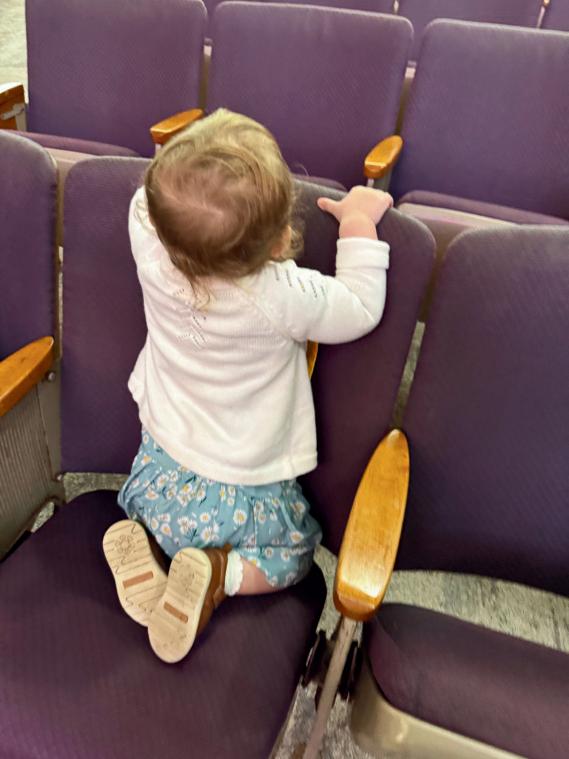

Barbara Blum
Isaac Cassel*
David Samuel Cohen*
Ida Dobbin
Edward Feldman
Emily Fishman*
Rabbi Carla Friedman
Gussie Ganz*
Stanley Geffon*



Barbara Blum
Isaac Cassel*
David Samuel Cohen*
Ida Dobbin
Edward Feldman
Emily Fishman*
Rabbi Carla Friedman
Gussie Ganz*
Stanley Geffon*
Herbert Goldstein*
Alvin Handler*
Mallory Leigh Hannah We
Rosalind Katz*
Annie Kranzel*
Freyda Miller*
Milton Newman*
Betty Potnick
Simon Priceman*
Bessie Rosenbleeth*
Eric Stephen Sekeres*
Erwin Stern*
Benjamin Wolfson*
David Yaffin
*Denotes plaque in Memorial Alcove
Reach out to us with any questions.
Amy L. Morrison - Rabbi
727-347-6136 - RabbiMorrison@TempleBeth-El.com
Tara O’Donnell - Director of Finance & Operations 727-347-6136 - Tara@TempleBeth-El.com
Jennifer Hannon - Director of Early Childhood Center 727-350-5885 - JennHannon@TempleBeth-El.com
Tracy Nash - Bookkeeper
727-347-6136 - Bookkeeper@TempleBeth-El.com
Tovah Feld - Communications & Engagement Coordinator 727-347-6136 - Tovah@TempleBeth-El.com
Allison Fowler - Office Administrative Assistant 727-347-6136 - Allison@TempleBeth-El.com
Mike Shapiro - Temple President 727-347-6136 - President@TempleBeth-El.com
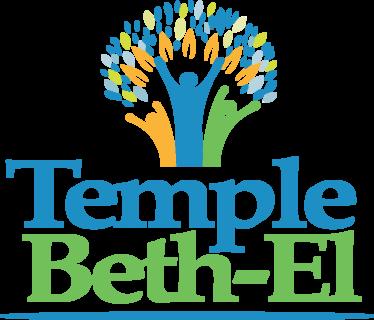
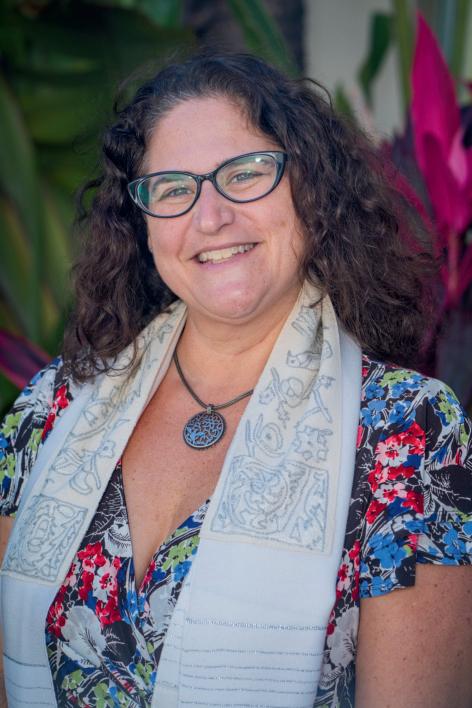
This week’s parshah, Ki Tavo, begins with a beautiful ritual: bringing the first fruits to the Temple. The farmer doesn’t just drop them off—he recites his story, beginning with “My father was a wandering Aramean…” It’s a moment of reflection, gratitude, and deep awareness of where one comes from and how far one has come.
Reading this during the month of Elul feels especially meaningful. Elul invites us to prepare—not just logistically for the holidays, but spiritually. I’ve been asking myself: What are my first fruits? What am I proud to bring forward from this past year? And just as importantly, what do I still need to work on?
In Ki Tavo, the farmer doesn’t stand alone—he stands in a larger story, connected to a people, a history, and a Divine presence. Elul reminds me that I’m not alone either. We're all doing this work of reflection together, each in our own way.
Traditionally, we hear the shofar blasted each morning of Elul, serving as a personal wake-up call for each individual. For me, it’s a reminder to slow down, to listen more closely to what’s stirring in my heart, and to begin the process of return—of teshuvah—with honesty and hope.
As we move through Elul and toward the High Holidays, may we all find the courage to reflect, the grace to forgive, and the strength to grow.
Wishing you a meaningful and gentle journey of preparation.
By Elana Arian & Noah Aronson
We return, we return, we return, return again.
We return, we return, return, return again and again … to Love / Truth / You.
Saturday, September 13
10am-11:30am - High Holiday Bootcamp
7pm-9pm - S’lichot, Havdalah, & Holiday Challahs
Sunday, September 14
8:45am-9:30am - Brotherhood Schmooze 9:30am - 12pm - Sunday School
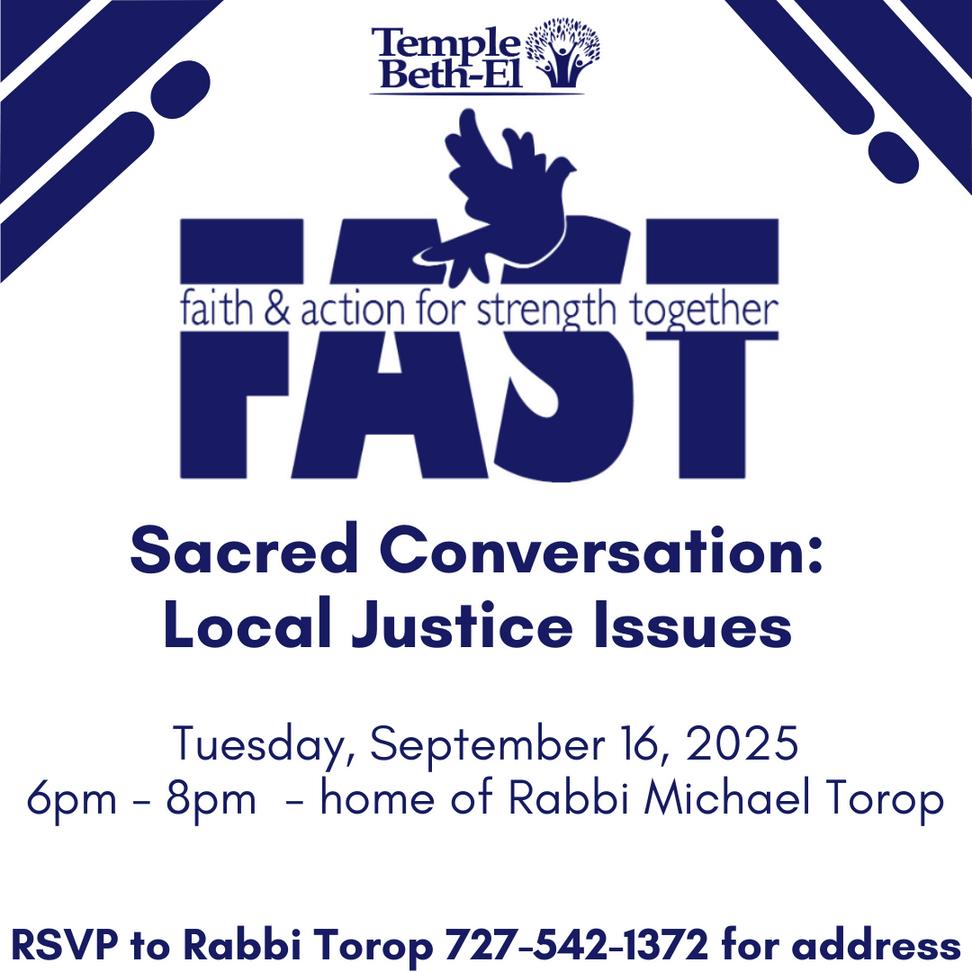
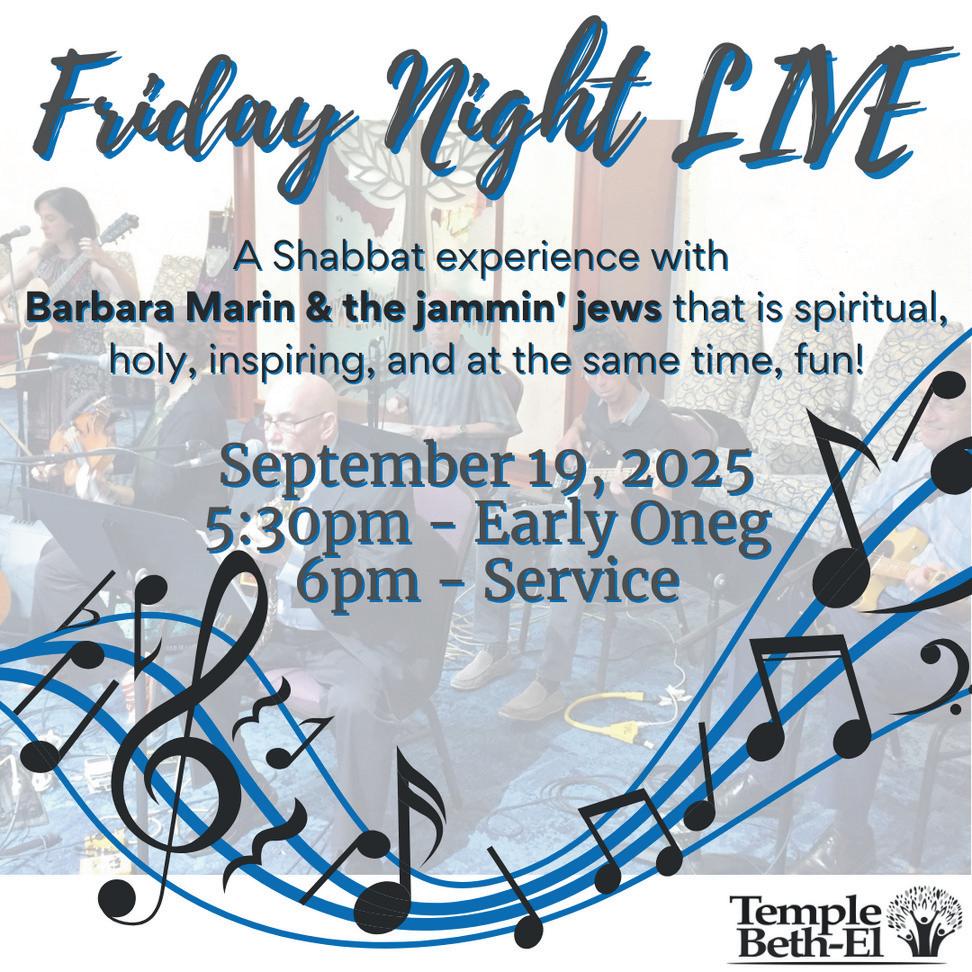
If you are new to Temple Beth-El, welcome!
OPEN COMMUNITY CREATES ENGAGING & DIVERSE JEWISH PATHWAYS
Hashiveinu Adonai eilecha v’nashuvah.
Chadeish yameinu k’kedem.
Located in St. Petersburg on Florida's beautiful west coast, Temple Beth-El is a Reform Jewish congregation that has served this area since 1928 and is focused on strengthening relationships and making connections. We are a welcoming Reform community for Jewish and interfaith households to experience an uplifting and joyful sense of belonging as we seek to connect our members with each other and the greater community and world around us.
Enjoy and have a Shabbat Shalom!
Parashat Ki Tavo: Deuteronomy 26:1-29:8
Saturday, September 13, 2025 / 20 Elul 5785
The Israelites are instructed to express their gratitude to God for their bountiful harvests and freedom from slavery by tithing ten percent of their crops for the Levite, the stranger, the orphan, and the widow. (26) The people are told to display on large stones God's commandments for all to see. (27:1-8)
The Levites are to proclaim curses upon those who violate God's commandments. (27:15-26)
The Israelites are told that if they obey God's mitzvot faithfully, they will receive every blessing imaginable. They are also told that if they do not fulfill their brit with God, many curses will descend upon them. (28:1-69) Moses reminds the Israelites of the miracles they witnessed in the wilderness and commands them to observe the terms of the covenant so that they may succeed in all that they undertake. (29:1-8)

Relax! God put the wiggle in children. Don’t feel you have to suppress it in our sanctuary or chapel. Sit towards the front where it is easier for your little ones to see and hear what is happening on the Bima. They tire of seeing the backs of other’s heads.
Quietly explain our rituals and sing or clap when appropriate. Children learn liturgical behavior by copying you.
If you need to leave services with your child, do so, but please come back. Remember that the way we welcome children in synagogue directly affects the way they respond to coming to synagogue, to God, to one another. Let them know that they are welcome in this house of worship, here, at Temple Beth-El.

